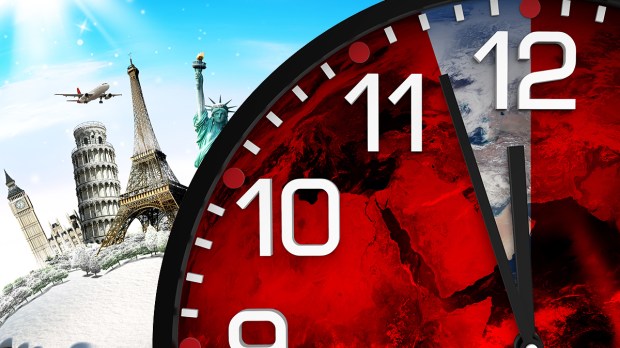In 1947 the Bulletin of the Atomic Scientists created the Doomsday Clock, an imaginary timepiece whose minute hand’s proximity to midnight represents the imminence of human extinction. In light of such looming catastrophes as nuclear warfare and climate change, our Doomsday Time is now 11:57:30. We are, apparently, closer than we’ve been in half a century to kingdom come.
On the face of it this flatly contradicts Jesus’ insistence that “no man, not even the angels in heaven, nor the Son, but only the Father” knows when the world will end (Matthew 24:36). Not one gospel manuscript includes the addition, “but only the Father . . . and the Bulletin of the Atomic Scientists.” But nuclear arsenals are growing all over the world, and our current president is – to put it mildly – confrontational. For some, that makes prophecies of atomic holocaust sound eerily credible. So if we are in fact within sight of annihilation, how should we react? What’s a Christian to do about the Doomsday Clock?
Taking the clock seriously — as an accurate measure of the factors which will bring about end times — invites one of two responses. The first is to admit we’re finished and prepare for the worst. That’s the strategy of the monied survivalists who, according to The New Yorker’s Evan Osnos, are staking out emergency retreats in New Zealand in which to weather the coming cataclysm. This feels to me like washing one’s hands of the world, abdicating any responsibility to work with the problems of the here and now. I can’t imagine Christ would want us to give the human race up for dead.
The other option is to try and head off the calamities that look most likely. That’s what the Bulletin suggests. The magazine’s executive director hopes the Doomsday Clock “raises the level of conversation [and] promotes calls to action.” It’s a summons to environmental awareness and dedicated political engagement, to concrete attempts at averting our demise.
But this approach, too, is flawed from a Christian standpoint. Because two things are certain according to Jesus: the world is definitely going to end, and we definitely can’t say when. Christ even expressly warns against taking political upheaval and meteorological anomalies as decipherable signs of Armageddon (Mark 13:5-8). In fact if there’s one other thing we do learn from the Gospel about the apocalypse, it’s that whatever predictions we make about its date or causes will be wrong. Consequently, our attempts to avert Judgment Day will probably be both misguided and futile. Taking shots in the dark to prevent an inevitable outcome is a recipe for ceaseless anxiety and eventual despair.
Jesus offers an entirely different approach. “Watch and stay alert,” he tells us, “because you don’t know when the time will come” (Mark 13:33). That amounts to neither “it’s going to happen so throw up your hands,” nor “try to see it coming and nip it in the bud.” What Christ commands instead is wide-eyed engagement with and attention to a world that could vanish at any moment, tomorrow or next millennium. Our ever-impending destruction should lead us not to panic or resignation but to deeper investment in the immediate instant, to “life in abundance” (John 10:10).
In times considerably less certain than ours, the theologian C. S. Lewis addressed an Oxford congregation while Hitler swept across Europe. “The war,” Lewis said, “creates no absolutely new situation: it simply aggravates the permanent human situation so that we can no longer ignore it. Human life has always been lived on the edge of a precipice.” Likewise, the Doomsday Clock only emphasizes what was always true: that this moment is the only one we can be sure we’ll get. So our present relationships and choices, virtues and vices, are of urgent and unique importance.
Now, only God can tell you what you personally ought to be doing — whether you should call your local representative or plant a tree, write an article defending (or opposing) Trump or make peace with your spouse. But I can tell you this: whatever it is, it matters. And not because it might save the world. The world, you may recall, has already been saved. No, your small kindnesses and grand designs matter for the same reason they always have, because every second of human joy is a second that was worth the death of God. So whatever you do, fight for your neighbor’s next second as if it were — as in fact it may be — his last.
[Editor’s Note: Take the Poll – Are you afraid of the Doomsday Clock?]

